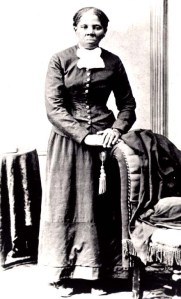“Every great dream begins with a dreamer. Always remember, you have within you the strength, the patience, and the passion to reach for the stars to change the world.”—Harriet Tubman
We have all heard of Harriet Tubman, but do we all know her story?
Born a slave on the Eastern Shore of Maryland around 1820, Harriet Tubman (Araminta “Minty” Tubman at the time) had suffered a lifetime of beatings and injuries. But in 1949, when she learned that she and several of her brothers were going to be sold, this young woman set off toward freedom, leaving her husband and parents behind.
Tubman’s first journey on the Underground Railroad probably took several weeks, but she reported, “When I found I had crossed that line, I looked at my hands to see if I was the same person. There was such a glory over everything. The sun came like gold through the trees, and over the fields, and I felt like I was in heaven. I had crossed the line.” She changed her name to Harriet (the name of her mother and one of her sisters), partly to mark her change in status or maybe to avoid detection by slave-catchers in the North.
Tubman’s joy at gaining her freedom was tempered by loneliness and intense longing for her family. “I was free, but there was no one to welcome me to the land of freedom. I was a stranger in a strange land…I was free, and they should be free!”
Over the next decade Tubman made between thirteen and nineteen journeys back into slave territory to bring her family and others to freedom, shepherding some 70 slaves north and assisting countless others. Despite the best efforts of slave-catchers who sought reward for finding her, Tubman was never captured. Years later, using the metaphor of the Underground Railroad she had traveled so regularly, she told an audience, “I never ran my train off the track, and I never lost a passenger.”
During the Civil War, Tubman assisted the Union Army, gathering intelligence and caring for escaped slaves. Forming a band of former slaves as scouts, she mapped terrain to help the military plan a gunboat assault. On the night of one raid, Tubman guided Union gunboats safely up the river, and as Union troops set fire to the plantations and seized valuable food and supplies, Tubman’s team rescued more than 750 slaves. Northern newspapers praised Tubman for her patriotism and skill—and for her recruiting efforts, since most of the newly freed slaves enlisted in the Union army.
Knowing the obstacles before her, Harriet Tubman nonetheless worked diligently to fulfill her dream of rescuing as many fugitive slaves as she was physically able to. She never veered from this dream, even when her own safety and security were in danger.
She is a model to women today—a model of courage to live out our dreams and vision with the same assertiveness she showed.

